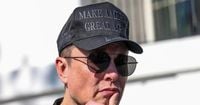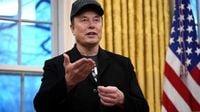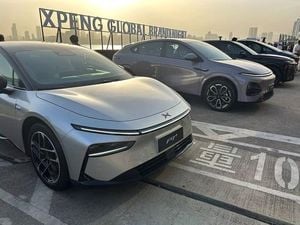Tesla Inc. is reportedly taking significant steps towards finding a new CEO to succeed Elon Musk, as the electric vehicle manufacturer grapples with declining sales and a tumultuous stock performance. According to a report by the Wall Street Journal on April 30, 2025, Tesla's board of directors reached out to multiple executive placement firms about a month ago to initiate a search for Musk's successor, a move that underscores growing concerns over the company’s leadership amid Musk's heavy involvement with the Trump administration.
This decision comes at a time when Tesla's stock price has experienced a dramatic decline, falling as much as 45% earlier this year before seeing a slight recovery. The company's profits have also taken a hit, with earnings plummeting by 71% in the first quarter of 2025, raising alarms among investors and board members alike.
In an effort to address these issues, Musk announced on April 30, 2025, that he would be stepping back from his role with the Department of Government Efficiency (DOGE) and would refocus his efforts on Tesla. Musk stated, “My time allocation to DOGE will drop significantly,” indicating he would spend only a day or two a week on governmental duties going forward. Analysts at Wedbush Securities expressed optimism that Musk would remain at the helm of Tesla for at least the next five years, suggesting that the board’s search for a new CEO might not be as urgent as initially thought.
However, the board’s concerns are rooted in the reality that Musk’s political engagements have not only distracted him from Tesla but have also sparked significant backlash against the company. Protests have become commonplace outside Tesla showrooms, and the brand's reputation among its former supporters has suffered. Many potential buyers have reportedly turned away from Tesla, influenced by Musk's controversial political stances and affiliations, particularly his embrace of far-right ideologies in Europe.
During a Cabinet meeting on the same day Musk announced his return to Tesla, President Donald Trump publicly thanked him for his service to the government, remarking, “You’ve really been a tremendous help.” Despite the praise, the tensions within the Trump administration have been palpable, with Treasury Secretary Scott Bessent reportedly getting into a shouting match with Musk earlier this month. These internal conflicts reflect the broader challenges Musk faces as he navigates his dual roles.
Additionally, Tesla’s position in the market is precarious due to ongoing trade tensions exacerbated by the Trump administration’s policies. Musk's efforts to advocate for lower tariffs have largely gone unheeded, and Tesla's sales in China remain vulnerable amid the trade war. However, recent moves by Trump to soften auto tariffs could provide some relief for Tesla, which manufactures most of its vehicles in the U.S. but relies on imported parts that were set to face a hefty 25% tariff.
As Tesla continues to confront these challenges, the board has reportedly met with Musk to discuss the need for him to publicly commit to dedicating more time to the company. While it remains unclear whether Musk was fully aware of the board's search for a new CEO, the discussions reflect a growing urgency to stabilize Tesla's leadership and financial performance.
In light of these developments, some analysts and investors have voiced concerns about Musk’s long-term vision for Tesla. Musk has pivoted the company’s focus from producing affordable electric vehicles to ambitious projects involving driverless taxis and humanoid robots, indicating a shift towards positioning Tesla as a leader in AI and robotics. This strategy has raised questions about the sustainability of Tesla’s core automotive business, particularly as competition in the electric vehicle market intensifies.
In recent investor calls, Musk acknowledged the fallout from his time spent in government, stating, “There’s been some blowback for the time that I’ve been spending in government with the Department of Government Efficiency.” Tesla’s Chief Financial Officer, Vaibhav Taneja, confirmed that the company had experienced a decline in vehicle deliveries, attributing some of the downturn to “vandalism and unwarranted hostility” directed at the brand.
Despite these setbacks, Tesla board members, including co-founder JB Straubel, have been actively engaging with major investors to reassure them about the company's future. The board, which has faced criticism for its perceived lack of independence and oversight regarding Musk, is reportedly seeking to add an independent director to bolster its governance structure.
As Tesla navigates this critical juncture, the implications of Musk's leadership decisions will likely shape the company's trajectory in the coming years. The ongoing search for a new CEO not only highlights the board's concerns about Musk's focus but also serves as a reminder of the challenges Tesla faces in maintaining its position as a leader in the electric vehicle market while managing the complexities of its founder's broader ambitions.
With Musk's future at Tesla uncertain and the company's performance under scrutiny, the coming months will be pivotal in determining both the direction of Tesla and the legacy Musk leaves behind. As the electric vehicle landscape evolves, stakeholders will be watching closely to see how Tesla adapts to the pressures of competition and changing consumer sentiment.





